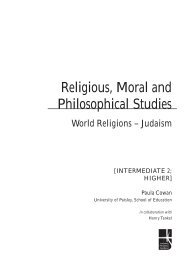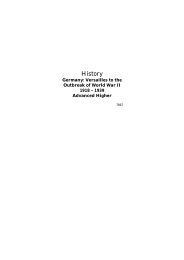Bertolt Brecht - Education Scotland
Bertolt Brecht - Education Scotland
Bertolt Brecht - Education Scotland
Create successful ePaper yourself
Turn your PDF publications into a flip-book with our unique Google optimized e-Paper software.
12<br />
THE TOP TEN<br />
Ewen shows Piscator’s radical theatrical innovations in fantastic detail, and<br />
demonstrates how these were vital introductions to <strong>Brecht</strong> of new, political<br />
and entertaining techniques. This chapter illustrates how objectivity meshed<br />
with political cabaret; how agit-prop raged with delight all over Germany;<br />
what cinema and Russian theatre offered; just how widespread and important<br />
the concept of collaboration was to these artists.<br />
Here too, Ewen clearly and entertainingly describes <strong>Brecht</strong>’s first steps at<br />
coming to terms with his marriage of theatre’s possibilities to his new and<br />
growing politicisation. He goes on to discuss <strong>Brecht</strong>’s revelation that ‘William’<br />
(Shakespeare) was also, to <strong>Brecht</strong>’s way of thinking, an ‘epic’ theatre<br />
practitioner.<br />
Other chapters are equally readable, packed with insights and pertinent to<br />
students of Drama and Theatre. Chapter XI, ‘The Recovery of Identity: The<br />
Epic Theatre’, contains lucid explanations and exemplifications of the acting<br />
technique associated with the Grundgestus and Gestus; the concept of<br />
Verfremdung; the actor audience relationship <strong>Brecht</strong> sought, etc., etc. The<br />
following chapter deals with the Lehrstücke. One can dip into any chapter and<br />
find essential information. The whole book is likewise valuable. This is a firstrate<br />
biography precisely because it makes a big issue out of both <strong>Brecht</strong>’s<br />
theory and his practice.<br />
McDonald, Jan, and Schumacher, Claude (eds.), The Citizens’ Theatre<br />
Season, Glasgow 1990, Glasgow: Theatre Studies Publications, The<br />
University, 1991<br />
It is important to try to maintain a Scottish angle on the course and this book<br />
provides, at least, a token towards this end.<br />
As its title suggests, it is a review of the work of one of <strong>Scotland</strong>’s most famous<br />
producing theatres over the course of the year when Glasgow had ownership<br />
of the title European City of Culture.<br />
It is, naturally, a very good resource in its own right as a survey of the work of<br />
one contemporary Scottish theatre company. Work by Pirandello, Ibanez,<br />
Dumas, Shaw, Goldoni, Rowe and, of course, <strong>Brecht</strong> is dealt with in a<br />
generally formulaic way.<br />
The formula gives the reader a synopsis, the play’s background, details of its<br />
performance, an interview with either a director, writer or actress (in the case<br />
of <strong>Brecht</strong>’s Mother Courage and Her Children, the interview is with Glenda<br />
Jackson who played the lead role), and a series of newspaper reviews of the<br />
production. It is worth noting from Jackson’s interviews that, although<br />
politically aligned with <strong>Brecht</strong>, she is influenced as an actress by both <strong>Brecht</strong><br />
and Stanislavski in her creation of the role of Mother Courage.<br />
DRAMA

















